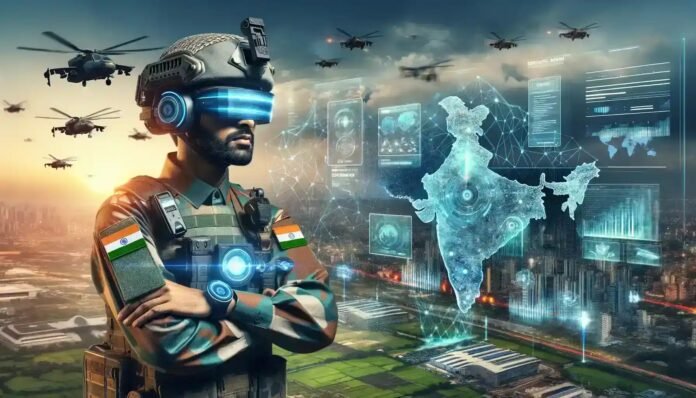India stands at the threshold of a transformative decade. By 2030, we are projected to become the world’s third-largest economy with a GDP of USD 5.8 trillion. But behind this macroeconomic milestone lies a deeper truth: our progress will be determined not just by policy or infrastructure, but by the people who power it.
India’s most strategic asset is its youth. With a median age of 29.5 years and over 68% of the population in the working-age group, we have a demographic edge few nations can match. But this edge is not automatic. It must be activated with skills, speed, and a mindset aligned with the future.
Digital and Defence: The Twin Engines of Growth
Two sectors will define India’s global competitiveness in the years to come: digital innovation and defence technology.
On one hand, India’s digital economy is poised to contribute nearly 20% of GDP by 2030, up from just 11% today. This surge is driven by demand for professionals in artificial intelligence, cybersecurity, data analytics, and cloud infrastructure—fields that didn’t exist at scale a decade ago.
India’s digital economy is poised to contribute nearly 20% of GDP by 2030, up from just 11% today. This surge is driven by demand for professionals in artificial intelligence, cybersecurity, data analytics, and cloud infrastructure—fields that didn’t exist at scale a decade ago
On the other, our defence modernisation isn’t just about physical assets. It includes cyber warfare units, AI-backed surveillance, space defence agencies, and digital command systems. Global players like Boeing and Raytheon are already expanding R&D operations in India, signaling a new wave of talent demand across security-tech and digital warfare.
The future requires engineers who can design smart drones, analysts who can monitor cyber threats in real time, and strategists who understand both defence protocols and data science. This convergence of deep tech and national security creates a massive, urgent upskilling imperative.
Where National Ambitions Meet Digital Education
India’s demographic strength will translate into economic power only if our workforce is prepared. And increasingly, that preparation is happening online.
According to Technopak’s 2024 report, over 47% of higher education enrollments in India now come from online or distance learning. The UGC’s 2022 decision to grant online degrees equal status to traditional ones has further accelerated adoption. This shift is not cosmetic. It’s systemic.
According to Technopak’s 2024 report, over 47% of higher education enrollments in India now come from online or distance learning. The UGC’s 2022 decision to grant online degrees equal status to traditional ones has further accelerated adoption. This shift is not cosmetic. It’s systemic
Young professionals are choosing modular, flexible, outcome-oriented programmes that fit into their lives and careers. Over 70% of enrollments in online upskilling programmes come from learners with less than three years of work experience. They’re not waiting for the future to find them. They’re building their readiness from Day 1.
Jaro Education: Architecting Workforce Readiness for India @ 2030
At this critical juncture, Jaro Education has emerged as a bridge between national ambition and individual capability.
With over 239 industry-aligned programmes, designed in collaboration with leading institutions like IIMs, IITs, and top global universities, Jaro is not just an education provider. It is a national enabler. From cyber defence certifications to AI-powered management diplomas, every programme is crafted to match the speed of innovation with the depth of academic excellence.
What sets Jaro apart is its dual lens: one eye on what the industry demands today, and the other on what India will need tomorrow.
India’s opportunity is no longer a projection. It’s here. The digital infrastructure is maturing. Global partnerships are expanding. The policy push is aligned. But technology alone can’t shape a nation. People can
A Nation That Learns is a Nation That Leads
The Indian skilling and certification market was valued at INR 11.5 lakh crore in FY2023 and is projected to grow to INR 14 lakh crore by FY2028. This growth is not a trend. It’s a mandate.
Corporates are ramping up internal learning investments. Government initiatives like Skill India Mission and Pradhan Mantri Kaushal Vikas Yojana are aligning national goals with local access. The NEP 2020 has solidified online, modular education as a cornerstone of India’s development vision.
Jaro Education sits at the confluence of all these forces, offering a learning model built for both individual growth and national progress.
The Real Question Is: Are We Ready?
India’s opportunity is no longer a projection. It’s here. The digital infrastructure is maturing. Global partnerships are expanding. The policy push is aligned. But technology alone can’t shape a nation. People can.
The real question is not whether India will create opportunities. It’s whether our workforce will be ready to lead them.\
At Jaro Education, we believe the answer is yes. Because the future of work will belong to those who prepare for it today.
The writer is Chief Executive Officer, Jaro Education






